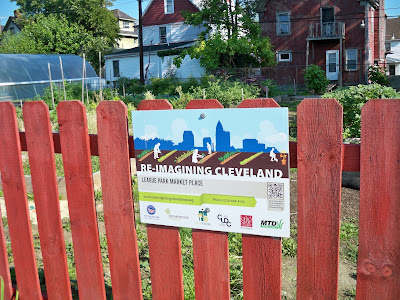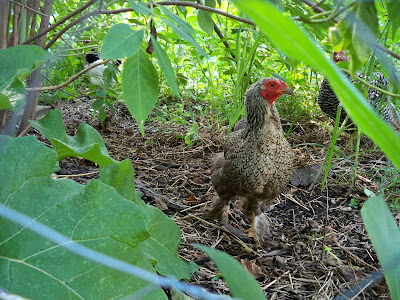Some of you may know that The College of
Wooster has a Senior Independent Study (IS), the equivalent of a senior
thesis. I have been working on my IS
since the start of my junior year and am almost done. I have completed my written thesis and passed
my orals, so what is left is my Symposium presentation. Some people have been interested to know what
I studied, so here is a bit more information.
A bit about my IS
I wanted to study urban agriculture in
Cleveland, Ohio after working there for a summer with a large educational urban
farm program. I really loved the work,
but was intrigued by a number of things I saw while working. I wanted to see the scope and depth of efforts
to grow food in the city, and I wanted to see what goals it was achieving.
I would really like to thank all of the
people who participated in my study. I
was able to do 21 really neat interviews of people who are running urban
agriculture projects throughout the city.
These individuals are of all ages and all walks of life, and are
involved in a wide variety of projects: community gardens, market farms, school
gardens, orchards, vineyards, permaculture, and more! The interview component was my favorite part
of my thesis, and it makes me think about doing more formal oral history
projects in the future.
 |
| Kale in Ohio City |
 |
| Chickens and permaculture in Ohio City |
 |
| Summer greenhouse squash in St. Clair-Superior |
 |
| Heirloom tomatoes in EcoVillage |
A field trip to Rid-All
Separate from my IS requirements, as
part of my participation in a Food Systems course this semester, I was asked to
construct a short unit on food justice which included discussing urban
agriculture. It was a challenge to
figure out how to teach and talk about urban agriculture. (People often put it on a pedestal as the
silver bullet to any city’s ills; while I do think urban agriculture has many
wonderful benefits, I also do believe that it has drawbacks and that it not
always set up to benefit the community where it is located.) What I decided to do what have an in-class
component where we discussed urban agriculture, but then invite students to
visit some urban agriculture projects in Cleveland and see for themselves what
growing food in the city looks like.
 |
| Rid-All's show greenhouse for aquaponics & vermicompost |
One of the farms we visited on the field
trip was Rid-All Green Partnership - a project that was not in my thesis but that
I had been eager to visit for quite some time.
Rid-All is Growing Power’s regional training center in Cleveland (see this post about my visit to Growing Power in Milwaukee). They run the same educational
programming that Growing Power does to build community food systems in all
types of contexts.
 |
| Co-founder Damien Forshe shows us the aquaponics system |
 |
| Watercress uses & filters fish tank wastewater |
 |
| Tilapia live in fish tanks and use recycled water from watercress |
I was very impressed to see the amount
of work that the three Rid-All founders had done in such a short amount of
time: their first greenhouse went up just over two years ago and they now have
half a dozen of them. Not only are they
growing produce and fish for a wide range of people in the city, they are
building the foundations for other people to grow their own food by serving as
an educational organization. Their
combination of business practices and mission of food, social, and economic
justice gave me hope that urban agriculture can be a form of sustainable
development.
 |
| Early spring greens in the greenhouse |
 |
| Co-founder Keymah Durden explains greenhouse production |
Wooster’s Senior IS Symposium
If you’re in Wooster, you can come learn
more about my IS research at our Symposium on Friday April 26th at 9:30am in Lean Lecture Hall. More details and a program (with all student
presentations listed) can be found here.














No comments:
Post a Comment